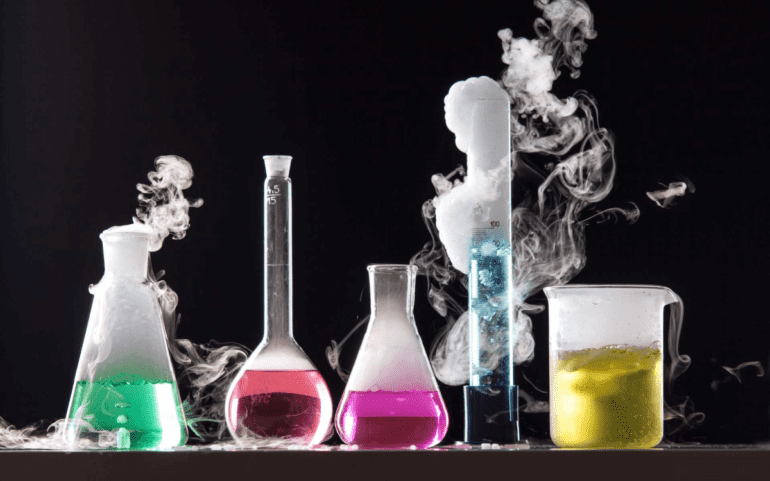TL;DR:
- Coscientist, developed by Dr. Gabe Gomes and his team, is an AI-powered system that aims to automate chemistry.
- The system breaks down complex chemistry tasks into smaller components, behaving like a team of chemists working in unison.
- Coscientist autonomously executed a Nobel Prize-winning chemical reaction, showcasing its remarkable capabilities.
- Chemistry, traditionally a time-consuming and labor-intensive field, can benefit greatly from the automation offered by Coscientist.
- Coscientist utilizes the power of GPT-4, a large language model, to generate detailed “recipes” for chemical compounds.
- The system comprises three AI components: an AI librarian, an AI for robotic arm instructions, and an AI for chemical synthesis.
- Initial tests have demonstrated Coscientist’s ability to handle complex tasks like synthesizing drugs and optimizing chemical reactions.
- While occasionally producing errors, Coscientist holds significant promise in aiding chemists with ideation, experimentation, and testing.
Main AI News:
In a realm that often conjures images of scientific laboratories and cutting-edge research, the marriage of artificial intelligence and chemistry is poised to revolutionize the field. Meet Coscientist, a groundbreaking system developed by Dr. Gabe Gomes and his colleagues at Carnegie Mellon University. Coscientist’s mission? To streamline and automate chemistry using the power of large language models, much like the well-known ChatGPT.
Coscientist’s modus operandi is reminiscent of a finely tuned orchestra. When given a task, this innovative system springs into action. One AI component scours the vast web to optimize a chemical “recipe,” while another translates these findings into precise code. A third AI takes charge of robotic arms, executing the experiment with unparalleled precision. The result? A harmonious convergence of AI and chemistry, with Coscientist at the helm.
The advent of large language models, including the popular ChatGPT, has already left an indelible mark in various domains, such as language understanding, audio analysis, and image recognition. However, Coscientist represents a pioneering leap towards the automation of chemistry itself.
The Unique Brilliance of Coscientist
Coscientist’s unique approach lies in its modularity. By breaking down complex chemistry tasks into smaller components, it operates like a cohesive team of chemists working in perfect sync. This approach accelerates the drug discovery process and paves the way for the realization of self-driving laboratories, a concept that has long eluded the scientific community.
Notably, Coscientist has achieved a remarkable feat by autonomously executing a complex chemical reaction that previously earned its inventors a Nobel Prize in chemistry. “This is the first time that a non-organic intelligence planned, designed, and executed this complex reaction that was invented by humans,” declared Gomes, showcasing the remarkable capabilities of this cutting-edge system.
The Long-standing Dream of Automated Chemistry
Chemistry, much like the art of perfecting a recipe, involves a meticulous process. Chemists begin with a goal, striving to create a chemical compound with minimal waste. However, the journey from concept to realization is often marked by tedious research, experimentation, and revisions.
Traditionally, synthesizing new chemicals has required hours of sifting through databases and literature, searching for similar molecules and reactions. Chemists laboriously fine-tune their protocols to achieve the desired results. The dream of automated systems to streamline these processes has tantalized chemists for years.
Injecting different chemicals in precise amounts and timing into separate “chambers” is a critical step in chemical synthesis. Typically performed manually, this process is ripe for automation. Affordable robots have emerged to tackle this task, but they are limited to performing a single reaction.
Enter Coscientist and the Power of GPT-4
Coscientist, powered by the algorithm behind ChatGPT, GPT-4, has brought us one step closer to realizing this dream. Through a careful comparison of various large language models, including GPT-4, Claude, and Falcon, researchers discovered that Coscientist could generate detailed “recipes” with high yields for chemical compounds.
Coscientist’s three-step approach involves the AI librarian, who learns from a wide array of online sources, prioritizing top chemical journals. This transparency in its learning process sets it apart from other black-box models. The second AI component comprehends user manuals for robotic arms, akin to deciphering instructions for a new tool. Lastly, the third AI operates the robotic arm, synthesizing chemicals while offering a valuable “professor mode” for feedback and continuous improvement.
The Path Ahead
In initial tests, Coscientist exhibited its prowess by effectively handling multiple colored liquids, akin to a skilled bartender crafting a masterpiece. As the complexity increased, the system successfully synthesized seven blockbuster drugs, demonstrating its adaptability and potential.
Moreover, Coscientist excelled in optimizing chemical reactions to increase yields, surpassing established machine learning methods in certain scenarios. While it occasionally produces erroneous results, as is common with large language models, it serves as a valuable tool for chemists, aiding in ideation, experimentation, and testing.
While Coscientist may still be in its nascent stages, it holds immense promise for the future of chemistry. With further development, it could emerge as a steadfast ally to chemists, tirelessly working to discover new phenomena, reactions, and ideas, allowing scientists to gain the rest they deserve while the robotic system continues its tireless exploration.
Conclusion:
The introduction of Coscientist, powered by GPT-4, into the field of chemistry represents a significant step towards automation and efficiency in scientific research. This innovative system has the potential to revolutionize the market by streamlining chemical processes, reducing manual labor, and accelerating the discovery of new compounds and reactions. Its ability to learn and adapt makes it a valuable tool for chemists, offering the prospect of enhanced productivity and groundbreaking discoveries in the future.

